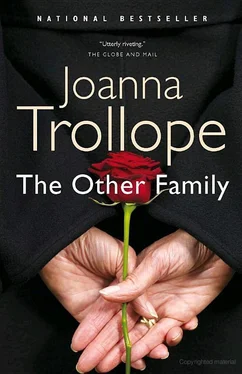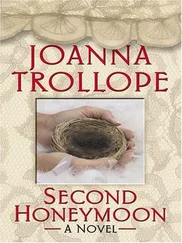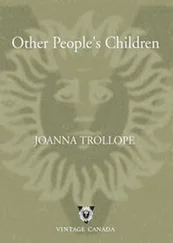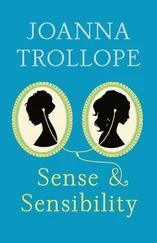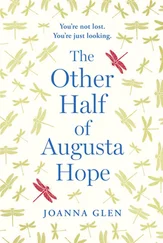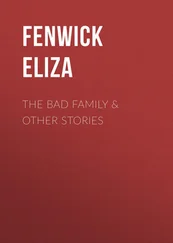Joanna Trollope - The Other Family
Здесь есть возможность читать онлайн «Joanna Trollope - The Other Family» весь текст электронной книги совершенно бесплатно (целиком полную версию без сокращений). В некоторых случаях можно слушать аудио, скачать через торрент в формате fb2 и присутствует краткое содержание. Жанр: Старинная литература, на английском языке. Описание произведения, (предисловие) а так же отзывы посетителей доступны на портале библиотеки ЛибКат.
- Название:The Other Family
- Автор:
- Жанр:
- Год:неизвестен
- ISBN:нет данных
- Рейтинг книги:5 / 5. Голосов: 1
-
Избранное:Добавить в избранное
- Отзывы:
-
Ваша оценка:
- 100
- 1
- 2
- 3
- 4
- 5
The Other Family: краткое содержание, описание и аннотация
Предлагаем к чтению аннотацию, описание, краткое содержание или предисловие (зависит от того, что написал сам автор книги «The Other Family»). Если вы не нашли необходимую информацию о книге — напишите в комментариях, мы постараемся отыскать её.
The Other Family — читать онлайн бесплатно полную книгу (весь текст) целиком
Ниже представлен текст книги, разбитый по страницам. Система сохранения места последней прочитанной страницы, позволяет с удобством читать онлайн бесплатно книгу «The Other Family», без необходимости каждый раз заново искать на чём Вы остановились. Поставьте закладку, и сможете в любой момент перейти на страницу, на которой закончили чтение.
Интервал:
Закладка:
the more he played his Gershwin. If she persisted, he switched to Rachmaninov, and played with his eyes closed. In the end – wel , it now looked like the end – she had marched out and bought her industrial diamonds and, she now realized, surveying her left hand in the first dawn of her new widowhood, let him off the hook, by finding – as she so often did, good old Chrissie – a practical solution to living with his refusal.
She let her hand fal into the plumpness of the duvet. The girls were al Rossiter. Tamsin Rossiter, Delia Rossiter, Amy Rossiter. That was how they had al been registered at birth, with her agreement, encouragement even.
‘It makes sense to have your name,’ she’d said. ‘After al , you’re the wel -known one. You’re the one people wil associate them with.’
She’d waited three times for him to say, ‘Wel , they’re our children, pet, so I think you should join the Rossiter clan as wel , don’t you?’ but he never did.
He accepted the girls as if it was entirely natural that they should be identified with him, and his pride and delight in them couldn’t be faulted.
Those friends from the North who had managed to accept Richie’s transition to London and to Chrissie professed exaggerated amazement at his preparedness to share the chores of three babies in the space of five years: he was a traitor, they said loudly, glass in hand, jocular arm round Chrissie’s shoulders, to the noble cause of unreconstructed Northern manhood. But none of them, however they might covertly stare at Chrissie’s legs and breasts or overtly admire her cooking or her ability to get Richie gigs in legendarily impossible venues, ever urged him to marry her.
Perhaps, Chrissie thought now, staring at the ceiling through which she hoped Dil y stil slept, they thought he had.
After al , the girls did. Or, to put it another way, the girls had no reason to believe that he hadn’t. They were al Rossiters, Chrissie signed herself Rossiter on al family-concerned occasions, and they knew her professional name was Kelsey just as they knew she was their father’s manager. It wouldn’t have occurred to them that their parents weren’t married because the subject had simply never arisen. The disputes that arose between Richie and Chrissie were – it was the stuff of their family chronicle – because their father wanted to work less and play and sing more just for playing and singing’s sake, and their mother, an acknowledged businesswoman, wanted to keep up the momentum. The girls, Chrissie knew, were inclined to side with their father. That was no surprise – he had traded, for decades, on getting women audiences to side with him. But – perhaps because of this, at least in part – the girls had found it hard to leave home. Tamsin had tried, and had come back again, and when she came home it was to her father that she had instinctively turned and it was her father who had made it plain that she was more than welcome.
Chrissie swal owed. She pictured Dil y through that ceiling, asleep in her severe cotton pyjamas in the resolute order of her bedroom. Thank heavens, today, that she was there. And thank heavens for Amy, in her equal y determined chaos in the next room, and for Tamsin amid the ribbons and flowers and china-shoe col ections down the landing. Thank heavens she hadn’t prevailed, and achieved her aim of even attempted daughterly self-sufficiency before the girls reached the age of twenty. Richie had been right. He was wrong about a lot of things, but about his girls he had been right.
Chrissie began to cry again. She pul ed her hand back in, under the duvet, and rol ed on her side, where Richie’s pil ow awaited her in al its glorious, intimate, agonizing familiarity.
‘Where’s Mum?’ Tamsin said.
She was standing in the kitchen doorway clutching a pink cotton kimono round her as if her stomach hurt. Dil y was sitting at the table, staring out of the window in front of her, and the tabletop was littered with screwed-up bal s of tissue. Amy was down the far end of the kitchen by the sink, standing on one leg, her raised foot in her hand, apparently gazing out into the garden. Neither moved.
‘Where’s Mum?’ Tamsin said again.
‘Dunno,’ Dil y said.
Amy said, without turning, ‘Did you look in her room?’
‘Door’s shut.’
Amy let her foot go.
‘Wel then.’
Tamsin padded down the kitchen in her pink slippers.
‘I couldn’t sleep.’
‘Nor me.’
She picked up the kettle and nudged Amy sideways so that she could fil it at the sink.
‘I don’t believe it’s happened.’
‘Nor me.’
‘I can’t—’
Cold water gushed into the kettle, bounced out and caught Amy’s sleeve.
‘Stupid cow!’
Tamsin took no notice. She carried the kettle back to its mooring.
‘What are we gonna do?’ Dil y said.
Tamsin switched the kettle on.
‘Go back to the hospital. Al the formalities—’
‘How do you know?’
‘It’s what they said. Last night. They said it’s too late now, but come back in the morning.’
‘It’s the morning now,’ Amy said, stil gazing into the garden.
Dil y half turned from the table.
‘Wil Mum know what to do?’
Tamsin took one mug out of a cupboard.
‘Why should she?’
‘Can I have some tea?’ Amy said.
‘What d’you mean, why should she?’
‘Why should she,’ Tamsin said, her voice breaking, ‘know what you do when your husband dies?’
Amy cried out, ‘Don’t say that!’
Tamsin got out a second mug. Then, after a pause, a third.
She said, not looking at Amy, ‘It’s true, babe.’
‘I don’t want it to be!’
‘None of us do,’ Dil y said. She gathered al the tissue bal s up in her hands and crushed them together. Then she stood up and crossed the kitchen and dumped them in the pedal bin. ‘Is not being able to take it in worse than when you’ve taken it in?’
‘It’s al awful,’ Amy said.
‘Wil Mum—’ Dil y said, and stopped.
Tamsin was taking tea bags out of a caddy their father had brought down from Newcastle, a battered tin caddy with a crude portrait of Earl Grey stamped on al four sides. The caddy had always been an object of mild family derision, being so cosy, so evidently much used, so sturdily unsleek.
Richie had loved it. He said it was like one he had grown up with, in the terraced house of his childhood in North Shields. He said it was honest, and he liked it fil ed with Yorkshire tea bags. Earl Grey tea – no disrespect to His Lordship – was for toffs and for women.
Tamsin’s hand shook now, opening it.
‘Wil Mum what?’
‘Wel ,’ Dil y said. ‘Wel , manage .’
Tamsin closed the caddy and shut it quickly away in its cupboard.
‘She’s very practical. She’l manage.’
‘But there’s the other stuff—’
Amy turned from the sink.
‘Dad won’t be singing.’
‘No.’
‘If Dad isn’t singing—’
Tamsin poured boiling water into the mugs in a wavering stream.
‘Maybe she can manage other people—’
‘Who can?’ Chrissie asked from the doorway.
She was wearing Richie’s navy-blue bathrobe and she had pul ed her hair back into a tight ponytail. Dil y got up from the table to hug her and Amy came running down the kitchen to join in.
‘We were just wondering,’ Tamsin said unsteadily.
Chrissie said into Dil y’s shoulder, ‘Me too.’ She looked at Amy. ‘Did anyone sleep?’
‘Not real y.’
‘She played her flute,’ Dil y said between clenched teeth. ‘She played and played her flute. I couldn’t have slept even if I’d wanted to.’
‘I didn’t want to,’ Tamsin said, ‘because of having to wake up again.’
Читать дальшеИнтервал:
Закладка:
Похожие книги на «The Other Family»
Представляем Вашему вниманию похожие книги на «The Other Family» списком для выбора. Мы отобрали схожую по названию и смыслу литературу в надежде предоставить читателям больше вариантов отыскать новые, интересные, ещё непрочитанные произведения.
Обсуждение, отзывы о книге «The Other Family» и просто собственные мнения читателей. Оставьте ваши комментарии, напишите, что Вы думаете о произведении, его смысле или главных героях. Укажите что конкретно понравилось, а что нет, и почему Вы так считаете.
